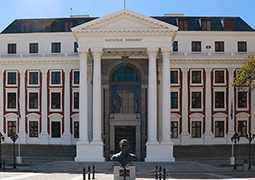
As the Organisation of African Unity marked its sixtieth anniversary this year, the National Assembly (NA) reflected on the organisation’s achievements by debating its role in upholding the emancipation of Africa’s people and advancing economic integration on the continent.
Setting the tone for the debate, Ms Moleboheng Modise of the ANC in the NA, provided some context for the organisation’s broad goal of promoting African interests and agenda on a world stage, goals that are enshrined in the AU’s Agenda 2063. The ratification of free trade among African states is aimed at accomplishing this imperative. A continent-wide policy trajectory to accelerate economic integration, growth and free trade among African states through industrialisation is necessary, she said.
In essence, she noted, this policy seeks to change Africa’s role as exporters of raw materials and importers of finished products. It seeks to make Africa a hub for manufacturing raw products and setting up a value chain that will benefit African people. “This could be successful if we establish and adhere to stipulated regulations that will govern the movement of both goods and people,” she said.
Beyond that, a stable and peaceful environment is required. African will achieve the benefits of free trade zones, “if it moves from a logic of war to that of peace,” she said. “Africa needs to silence the guns if it were to be prosperous and reach its full potential.”
Mr Thembekile Majola of the Democratic Alliance in the NA said the AU Agenda 2063 is the blueprint for Africa’s emancipation and economic development. However, it has not yielded the desired results. “AU’s industrialisation, trade, investment and economic integration policies have failed because AU has failed to engage with the legislative institutions such as Pan-African Parliament that are responsible for nation states’ budget allocations and oversight,” he said.
Ms Natasha Ntlangweni of the Economic Freedom Fighters said despite the AU’s policies that agitate for economic integration and free trade amongst African states, African countries continue to trade most if not entirely with their former colonizers. “The United Nations’ Trade Report shows that there was 2% of trade among African countries between 2015-2017, 47% with America, 69% with Asia and 67% with Europa. This affirms the claim that economic integration and free trade among African countries is still a pipe dream, she said.
Mr Mkhuleko Hlengwa of the Inkatha Freedom Party said Africa is still dealing with food insecurity and rising unemployment. Meanwhile, instead of playing a pivotal role in realising AU’s Agenda 2063, South Africa’s potential is hampered by corruption and its support of Russia has a negative impact on its standing in global affairs. These political choices hamper South Africa’s role in achieving the AU’s policy imperatives.
This was a view shared by Mr Frederik Mulder of the Freedom Front Plus, who claimed that the fragmented nature of African markets inhibits efficiencies and constrains economic growth. Many countries are vying for few markets, but those who succeed are those with competitive institutions and policies. Sadly, he claimed, Africa lacks most of these economic criteria.
The Minister of International Relations and Cooperation, Dr Naledi Pandor, said there is much to be proud of as we celebrate the AU’s sixtieth birthday. One of positive sign is the growing consensus around a road map towards Africa’s economic integration. “The executive and Parliament must contribute actively in the realisation of free trade zones on the continent through necessary regulatory framework, as well as infrastructure logistics that would make free trade zones a reality.”
But Dr Pandor emphasised that without peace and stability such an ideal will not come to fruition. Conflict remains one of the impediments of sustainable growth in Africa, she went on to say. South Africa can be proud of the role we played in brokering a peace deal in the Central Republic of Congo in 2019 and in 2018 between Ethiopia and Eritrea, Dr Pandor said.
Turning to current hostilities in Sudan, she said, the conflict there is a lesson that we should not be content with merely signing peace agreements and should strive also for sustainability. She blamed the interference of foreign forces in African affairs, which have often led to conflicts in African states. Nonetheless, Dr Pandor said: “We should build on the sense of hope prevalent on the continent today, that our youth continent will rise above the myriad of its challenges and attain its true renaissance,” she maintained.
Abel Mputing
8 May 2023

